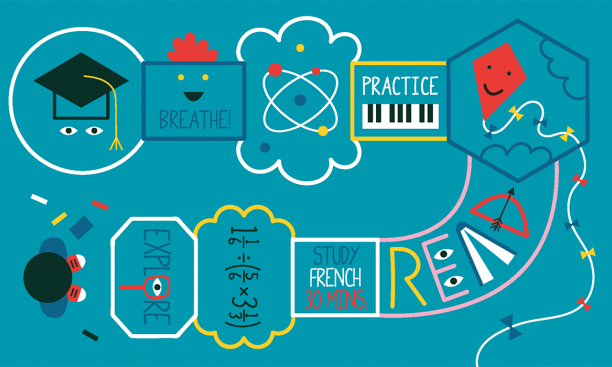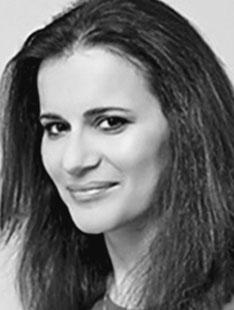
Having gone to graduate school in social work when my children reached school age, I was busy thinking about other people’s problems. I did not expect the call that came from my son’s third-grade teacher.
Alex cried today. OK, I thought, using newly minted therapeutic inquiry skills, could you tell me a little more? He was worried that if he didn’t do well, he wouldn’t be able to go to one of the “world’s best universities, like his parents.” Excuse me? My 8-year-old child was overcome by anxiety about the relationship between a third-grade quiz and his college-admission prospects?
My husband and I had not grown up with pressure to go to Princeton. We were two kids from New Jersey public high schools, and it felt more like we ended up there. We had worked hard. I was serious about my studies, maybe too serious. But my childhood was pretty unscripted.Whatever I did when I was 8, I did it because it seemed interesting, or fun, or because there was nothing else to do. I played house; jumped on beds; hit Wiffle balls until it got dark outside. I read a lot. I am retrospectively grateful for the limited adult involvement and that I never felt that what I did at that age would have much bearing on the rest of life. The relentless pursuit of any particular college — or any particular version of success — was happily off my radar.
My son’s worry about the consequences of third-grade social studies crystallized a vague, sickening sense that something had shifted. Four-year-old travel soccer. Giant “homework packets” in kindergarten. Expensive after-school academic drills and tutoring. The assumption that busy was the better — or only — option. I felt rushed. Was it any wonder my son did?
We got explicit with our kids about our expectations that they pursue what was interesting, fun, and meaningful. I avoided pushing “passion.” Most little kids, let alone adults, don’t know yet what they are passionate about, and the suggestion can feel like pressure. Exploring interest, though ... that’s real. And it can change. A sports enthusiast, our third-grade boy refocused his thoughts about college on learning the capacity of Division I football stadiums. That worked for him. We managed the message in our home: Love learning. Explore. Take good risks. Engage in what you love now.
I stopped buying college-branded onesies for new babies (sorry, U-Store). I stopped laughing at jokes or predictions about toddlers’ careers or athletic prospects. When I took a job as a pre-med adviser at Princeton, I saw that going to Princeton didn’t just “happen” these days. It was part of a carefully choreographed performance: for some, an inspired journey; for others, an exhausting push.
Observers of higher education have documented the rise in mental-health problems among college students, including in the 2009 film Race To Nowhere. Directed by parent-activist Vicki Abeles, the film exposed what I was worried about for my own children, and what I was hearing as the prelude to many of my Princeton students’ experiences — disengagement and stress-related illness. I saw the film first in a small venue with 11 others. I knew I needed to get it in front of my whole community.
The Princeton school district is considered one of the highest-performing in the nation. But if you listened carefully to conversations of people waiting in line for coffee — about kids going to “great schools” — or looked at the results of a district survey on student well-being, the subtext was painful: Many of our children were driven more by anxiety than joy or purpose.
I arranged to screen Race to Nowhere at Princeton High School. More than 500 parents came to see it, and in the conversation that followed, many said they were worried about their children’s homework load. They said they felt conflicted by how hard they were pressing for travel soccer — and travel everything — and how little time there seemed to be for family, friends, or free play. They were confused by how, or why, they had entered the race. They were grateful for the rare opportunity to say so aloud.
That was the origin of Princeton Balance, a Facebook page for parents seeking a reality check on their instincts. Was it protecting snowflakes to question whether homework in grade school is beneficial? No! It turns out that the oft-quoted “10-minutes-per-grade-level” homework rule isn’t based on evidence at all. Is it indulgent to prioritize your adolescent’s eight to 10 hours of sleep each night? Only if you would say the same for meeting recommended daily requirements for nutrition. The Facebook site was a place to share research that affirmed parental instincts as well as my professional observations.
Because I had worked at Princeton and with students applying to college and medical school, I wasn’t naive about “what it takes” to be admitted or to be prepared for the rigor of selective colleges or professional schools. But the more I looked, what I found was that parents, students, and society would be better served by redefining goals that were more particular to individual kids, less obsessed with a narrow prescription for success, and more about vigor than rigor. Vigor means being challenged, but emerging with more energy, more enthusiasm than when you entered. At a minimum, perhaps we could collectively exhale if we took the blinders off in the early years? Princeton Balance was a step toward reclaiming balance and authenticity in childhood and education.
I can’t say our parental navigation was flawless, but my personal and professional views converged around the quest for balance and authenticity.
For my own kids, and for those I was advising, I am inspired by the notion that “[the] combination of play, passion, and purpose ... best develops the discipline and perseverance required to be a successful innovator,” as Tony Wagner writes in Creating Innovators. I choose “interest” over Wagner’s “passion,” and balance might be elusive on any given day. But it is game-changing to hold the ideal of balance as a priority. The difference can mean a happy kid at the end of a busy day instead of one who is tired and dragging. “Internal locus of control” separates an inspired pre-med from one likely to burn out en route to medical school. Taking time to breathe is not weakness or laziness; it is essential to the development of a physically and emotionally healthy human being and to the ability of a doctor to practice good medicine. Mindfulness — what Jon Kabat-Zinn calls “the practice of moment-to-moment, open-hearted awareness” — might just be the basis of our best parenting, the most important gift we could give our children. A useful question before lights out might be, “What did you do to unwind today?” not, “Did you finish every last algebra problem?” It’s about mindset.
Why is it so hard for a parent to do what seems intuitively right? Why are college counseling offices overwhelmed by students with depression and anxiety? I think what needs treatment most is our national mindset about parenting and education. Taking seriously the notion of service as a Princeton alum, a parent, and an educator, last year I ran for a seat on the Princeton Public Schools Board of Education. I campaigned on a platform of “excellence and balance.” I’m convinced that these two ideals can coexist rather than compete with each other.
As a newly elected official, I have much to learn. I’m hopeful that we can move the needle in a district that can be a bellwether. What creative sparks might fly if elementary-school kids spend more of their after-school hours unstructured? I’m intrigued by Lenore Skenazy’s Let Grow movement to “future-proof our country” by promoting curiosity and independence and countering overprotection. I’m taking notes as schools take steps to eliminate or decrease reliance on AP exams in favor of deeper and more enthusiastic engagement.
Parents and grandparents, if you are worried about what your children might lose if you relax the reins, I ask you a different question: What might they gain? What I’ve learned from raising my own two children (the worried third-grader has graduated from college, and his sister is starting her sophomore year) and from advising hundreds of others is that the script in your head is the least interesting part of their stories. The magic is in the parts that they imagine for themselves when you let go.
A CALL FOR ALUMNI VOICES
Throughout the year, PAW will publish essays by alumni about things they’ve learned at Princeton or since graduating. We’re looking for voices on a wide range of topics that could help other alumni navigate through careers, family issues, and ethical dilemmas. If you would like to write an essay, please send your idea to pawessay@princeton.edu. Do not send completed essays, please.

